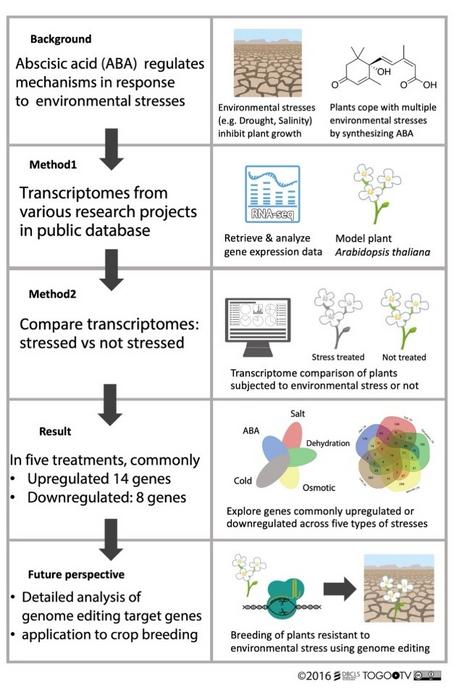Plants can be temperamental. Even weeds along the side of highways or pushing their way up in the cracks of concrete sidewalks can get stressed out by dehydration, cold, excess salt and more. Researchers at Hiroshima University have identified 14 genes that thale cress — a plant commonly used in genetic investigations since its genome is well documented — express more when responding to five specific stressors, as well as eight genes that the plant suppresses.

Credit: Mitsuo Shintani/Hiroshima University
Plants can be temperamental. Even weeds along the side of highways or pushing their way up in the cracks of concrete sidewalks can get stressed out by dehydration, cold, excess salt and more. Researchers at Hiroshima University have identified 14 genes that thale cress — a plant commonly used in genetic investigations since its genome is well documented — express more when responding to five specific stressors, as well as eight genes that the plant suppresses.
They published their results on March 22 in Frontiers in Plant Science.
“Abiotic stresses — as opposed to biotic stresses like pests or disease — such as drought, salinity and cold negatively affect plant growth and crop productivity. Understanding the molecular mechanisms underlying plant responses to these stressors is essential for stress tolerance in crops,” said corresponding author Hidemasa Bono, professor in the Laboratory of Genome Informatics at Hiroshima University’s Graduate School of Integrated Sciences for Life. Bono is also affiliated with the Laboratory of Bio-DX in the university’s Genome Editing Innovation Center.
“The plant hormone abscisic acid (ABA) is significantly increased upon abiotic stressors, inducing physiological responses to adapt to stress and regulate gene expression. Although many studies have examined the components of established stress signaling pathways, few have explored other unknown elements.”
To better understand the molecular pathways that allow ABA to increase, the research team analyzed public RNA sequencing data on thale cress, or Arabidopsis thaliana. RNA sequencing is a technique that enables scientists to identify and quantify specific sequences of genetic instructions programmed in an organism’s RNA. This data can reveal how different variables may increase or decrease the expression of certain genes.
Bono and his team specifically focused on five ABA-related stress conditions: ABA, when the hormone is applied directly to the plant; salt, which changes how the plant can use water; dehydration, or how much water the plant has; osmotic, when plant cells swell or shrink inappropriately; and cold.
“The data-driven studies have the advantage of analyzing large and independent datasets, which can lead to the identification of novel targets, distinct from the extensively studied established factors and accelerate the development of stress-tolerant crops,” Bono said.
The researchers performed a meta-analysis of 216 paired datasets, combining those research results and reanalyzing them to identify where data might overlap or reveal previously unknown connections.
The meta-analysis revealed that 14 genes were commonly up-regulated and eight genes were commonly down-regulated across all five ABA-related stress responses investigated. Bono noted that some genes regulated by salt, dehydration and osmotic treatments were not regulated by ABA or cold stress, suggesting that they may be involved in the plant response through a different signaling pathway.
“Our meta-analysis revealed a list of candidate genes with unknown molecular mechanisms in ABA-dependent and ABA-independent stress responses,” Bono said.
“These genes could be valuable resources for selecting genome editing targets and potentially contribute to the discovery of novel stress tolerance mechanisms and pathways in plants. We will continue to develop methods and utilize data from public databases and conduct comparative analysis from various angles to unravel the unknown mechanisms of stress response in plants.”
Co-authors of the study are Mitsuo Shintani with the Graduate School of Integrated Sciences for Life at Hiroshima University and Keita Tamura with the university’s Genome Editing Innovation Center.
The Center of Innovation for Bio-Digital Transformation (BioDX) and the Japan Science and Technology Agency supported this research.
###
About Hiroshima University
Since its foundation in 1949, Hiroshima University has striven to become one of the most prominent and comprehensive universities in Japan for the promotion and development of scholarship and education. Consisting of 12 schools for undergraduate level and 4 graduate schools, ranging from natural sciences to humanities and social sciences, the university has grown into one of the most distinguished comprehensive research universities in Japan. English website: https://www.hiroshima-u.ac.jp/en
Journal
Frontiers in Plant Science
DOI
10.3389/fpls.2024.1343787
Method of Research
Meta-analysis
Article Title
Meta-analysis of public RNA sequencing data of abscisic acid-related abiotic stresses in Arabidopsis thaliana
Article Publication Date
22-Mar-2024
COI Statement
The authors declare that the research was conducted in the absence of any commercial or financial relationships that could be construed as a potential conflict of interest.




